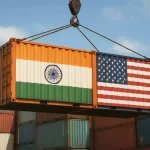Listen to the audio version of the blog here:
As the world rethinks its manufacturing dependencies, one state in India is stepping into the spotlight and reshaping global supply chains. As companies worldwide seek alternatives to China’s manufacturing dominance, India, particularly Tamil Nadu, has emerged as a key beneficiary.
The Emerging Manufacturing Hub
Tamil Nadu has strategically positioned itself as a prime destination for companies adopting the “China+1” strategy, seeking to diversify manufacturing bases. The state’s strengths in electronics and automotive sectors have been pivotal in attracting significant investments.
The electronics sector in Tamil Nadu has seen exponential growth, with exports surging from $1.26 billion in 2021 to over $12.6 billion currently. Major global players, including Foxconn, have established significant operations in the state, employing over 40,000 workers. Tamil Nadu’s automotive sector is thriving, with substantial investments from companies like Tata Motors and Hyundai, the state continues to attract investments.
Beyond electronics and automotive, Tamil Nadu is diversifying into non-leather footwear and technical textiles. This expansion is further evident in the non-leather footwear and technical textiles space, where Taiwanese giants such as Hon Fu, Pou Chen, and Dean Shoes are anchoring Tamil Nadu’s diversification efforts .
Strategic Initiatives and Future Outlook
The Tamil Nadu government is proactively fostering a conducive environment for manufacturing growth. Initiatives include developing specialized industrial clusters and establishing the ‘India Centre for Advanced Manufacturing’ in Chennai, aiming to support innovation, sustainability, and R&D in manufacturing.
India’s Promising Manufacturing Future
Tamil Nadu’s manufacturing ascent signals India’s growing relevance in the global supply chain realignment. As more companies explore alternatives to China, the state’s robust infrastructure, talent pool, and policy-driven growth make it a compelling destination. As global companies seek alternatives to traditional manufacturing hubs, India’s robust infrastructure, skilled workforce, and supportive policies position it for sustained growth and success in the manufacturing sector.



